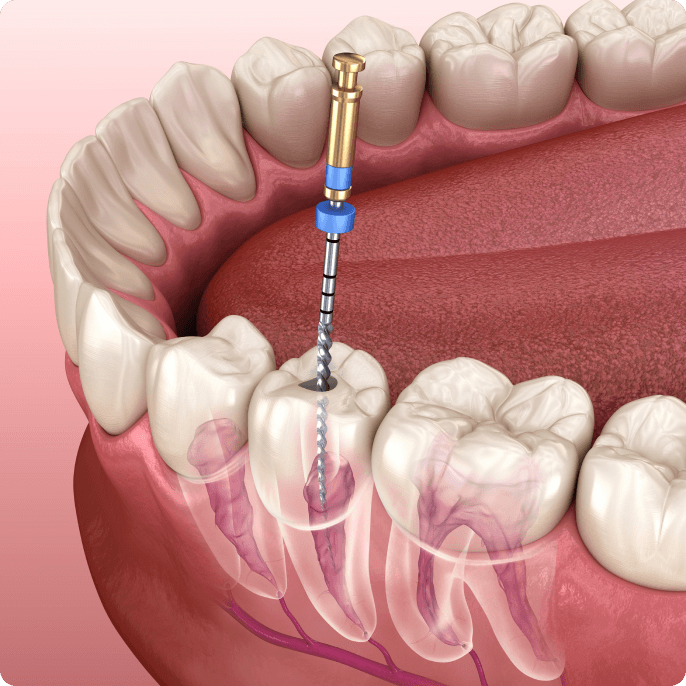
Root Canal
Accommodation

Anasthesia

Length of procedure

Companionship

Our own specialist endodontologist professor performs this treatment regularly to solve patient’s root canal problems, giving them relief from infection and discomfort.
The primary objective of dentistry is to maintain a patient’s healthy teeth and their ability to chew normally. On occasion the dental pulp within the root canal might become inflamed due to the invasion of unwanted bacteria. If this is the case, the dental pulp tissue has to be removed, the root canal cleaned and treated, and the canal space filled with a tissue-friendly filling. Today, with the development of modern technology, endodontics, or root canal treatment, is performed painlessly and quickly, and depending on the condition of the tooth, can be completed in one or two visits to our clinic.

It is always better to maintain an original tooth rather than replace it with an implant or dental bridge, as it is more important for oral health to maintain healthy teeth. Therefore, performing root canal treatment on an inflamed tooth to restore it, rather than removing that tooth and inserting an implant or dental bridgework is advised. Teeth that have undergone root canal treatment will remain for many years, or for life, with good oral and dental healthcare.
The root canal treatment must be performed by a specialist endodontologist.
A root canal treated tooth must be veneered to prevent further bacterial incursions into the root canal.
Individuals must take special care for their teeth after root canal treatment, and to avoid eating hard foods, especially to protect any dental veneers from damage.
Get a free offer now!
We tell you the total cost of your treatment from the beginning and then avoid any additional costs. You can be assured that there will be no extra cost, except the total cost of dental treatment sent to you. You will be answered by both email & WhatsApp.
Canal Fill Fiber Post
In badly damaged teeth it may be necessary to provide extra support to securely hold a crown in place, in which case a ‘Canal Fill Fibre Post’ is required. With the result of advancing technology, ‘fibre posts’ are now light translucent, and with a crown made from similar material, the tooth will appear completely natural. The ‘Fibre post’ treatment procedure can be completed within 15-20 minutes when performed by an expert using proper equipment and correct techniques.
The crown of the tooth must be permanently restored after the root canal treatment, giving the patient the ability to use the tooth normally. This restoration, if performed using the correct techniques may serve the patient for many years, or even for life.
An X-Ray is taken to identify the problem
Local anaesthesia must be administered to eliminate sensation from the tooth and surrounding tissue
Tooth decay is removed and access to the dental pulp in the root canal is made
Layers of infected dentin in the root canal are eliminated
The root canal is then disinfected to remove bacteria
An antiseptic is applied and kept in the canal for some time to ensure the eradication of remaining bacteria, and a temporary filling is applied
On a second visit further cleaning of the root canal takes place before a permenant restoration of the tooth is made
Acids, generated by bacteria colonising the surface of the tooth, eat away at the enamel and dentine of the tooth, resulting in tooth decay. Without early treatment, the bacteria can migrate to the pulp tissue within the tooth and cause inflammation in the root canal.
If the patient experiences pain and sensitivity spontaneously, or when induced by any external stimulus, such as extremes in temperature and chewing, it is likely that the patient has an inflammation or onset of inflammation. Other signs, such as excessive tooth discolouration may also indicate inflammation. Advanced infection, running the length of the root, can cause an abscess which may result in a small or large swelling of the cheek, indicating that root canal treatment is urgently required.